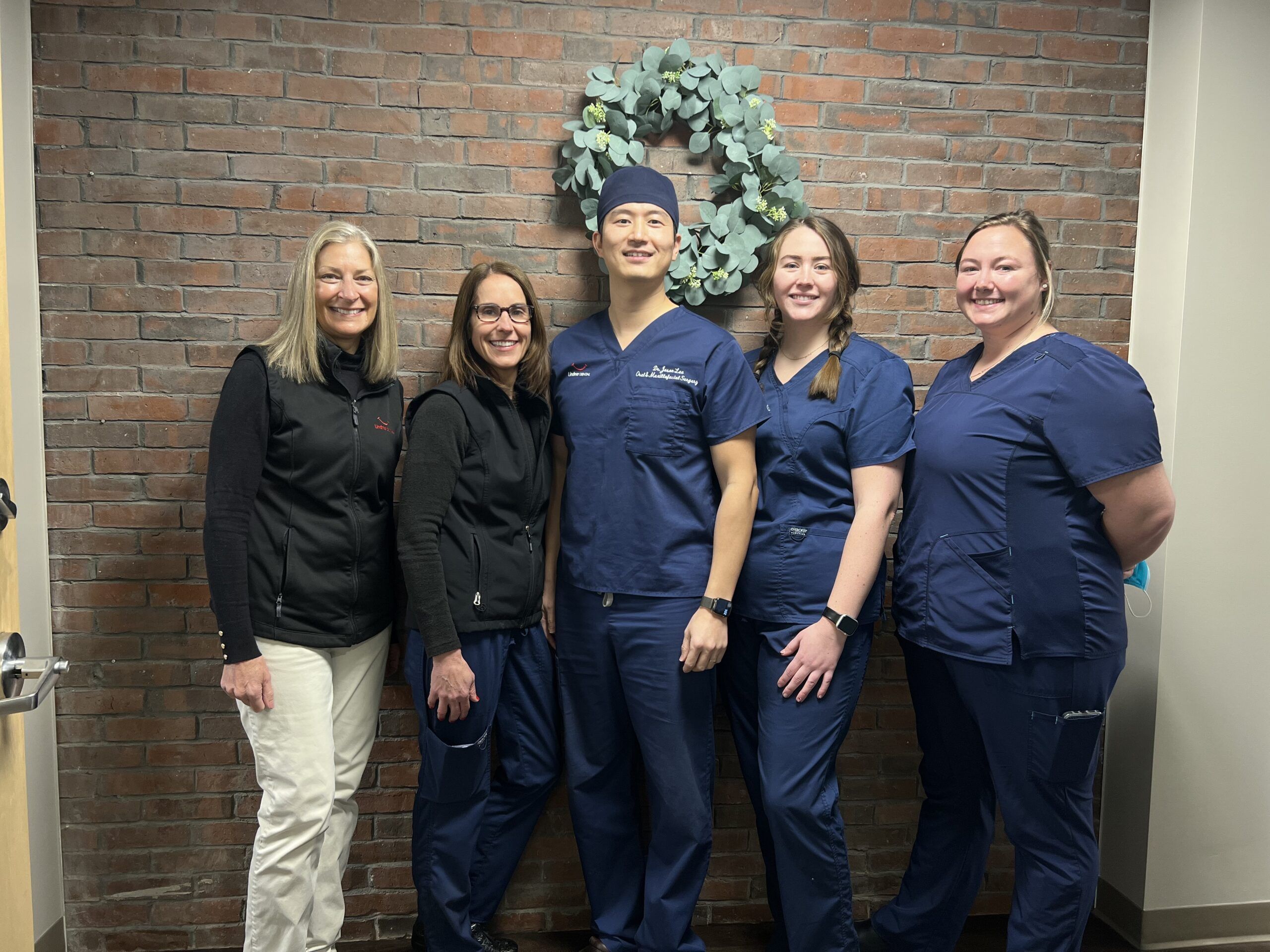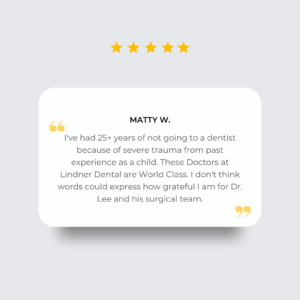Specialized Dental Care for the Entire Family!
Oral, Maxillofacial & Implant Surgery in Bedford, NH
The thought of oral surgery can sometimes be a little daunting but with the right dental team, there is nothing to worry about. At Lindner Dental Associates, we’re committed to providing top-notch dental care while keeping patients relaxed and comfortable. There is no need to travel to specialists for oral surgery, because we offer a broad array of services at our practice.
Our Mission: Our goal at Lindner Dental is to provide our patients the most comfortable experience while having oral surgery. We understand your concerns and anxiety regarding surgery. Dr. Lee and his staff will walk you through each step of the way, and help you obtain the best surgical outcome.
Why Would I Need Oral Surgery?
Oral surgery may be needed for patients with a wide range of dental and health concerns. The removal of wisdom teeth, exposure of an impacted tooth, or extraction of an infected tooth are all common oral surgery needs. Removing these teeth can prevent pain, infections, or worse dental conditions from occurring in the future. These procedures prevent your current teeth from shifting or becoming infected, damaging nerves, or bringing about other serious dental concerns. Oral surgery may also be required when patients are suffering from a facial injury due to a car accident, sports injury, or other trauma. Some patients may require jaw reconstructive surgery. The necessity for oral surgery varies based on the individual patient and the state of their mouth, teeth, and jaw. If you think you may need oral surgery, please reach out to our team today.
What Dental Issues Can Oral Surgery Resolve?
Our comprehensive in-house oral surgery procedures are capable of addressing many common dental issues, including:
- Tooth extractions
- Dental implants
- Oral Pathology
- TMJ Disorder & Therapeutic Botox
Oral Surgery at Lindner Dental Associates: Where Expertise Meets Compassion
At Lindner Dental Associates, our oral surgery team stands out for its exceptional dedication and expertise. Led by Dr. Lee, our team is committed to transforming lives through advanced oral and maxillofacial surgery services. With a focus on skill, experience, and compassion, we strive to ensure your comfort and relaxation throughout every procedure. Whether you’re dealing with pain from wisdom teeth or seeking dental implants, our oral surgery team will go above and beyond to make your experience as painless and stress-free as possible.

Oral & Maxillofacial Surgery Procedures in Bedford, NH
Lindner Dental Associates provides oral, maxillofacial, and implant surgery procedures. Below are some common procedures our oral surgery team delivers to patients in need in Bedford, NH. Contact our office today for more information on each service and to schedule your consultation.
Wisdom Teeth Removal
Third molars are commonly referred to as “wisdom teeth”. They are usually the last teeth to develop and are located in the back of your mouth, behind your second molars. A special x-ray of your jaw is taken to assess the position of your wisdom teeth and to determine whether they need to be removed. Pain, swelling, crowding, abnormal x-rays, and impaction are reasons to get your wisdom teeth evaluated. Dr. Lee will usually draw your blood (usually during IV placement) to make platelet-rich fibrin (PRF), which is placed back into the extraction sockets to promote better healing and minimize your chance of getting a dry socket.
Dental Implants Surgery
A dental implant is made of titanium and is used to replace a tooth that is missing or extracted. It can be used to replace a single tooth, multiple teeth, or even the entire arch. There are two components of a dental implant. Dr. Lee will perform the surgical extraction, placement of the dental implant into the bone, and additional bone grafting as needed. After a period of healing (usually about three months), your restorative dentist will fabricate a crown that gets fitted to your dental implant. This procedure is less invasive than most patients think, and it is the gold standard of treatment for replacing missing teeth. Dr. Lee uses advanced imaging (CBCT) and technology (3D printed surgical guides) to achieve the best possible outcome for our patients.
Bone Grafting For Implants
After a tooth is extracted, the walls of the extraction socket usually shrink. To minimize this shrinkage of bone, Dr. Lee places bone graft material into the extraction socket at the same time as your extraction. After a period of healing (usually about three months), the socket bone is preserved, and a dental implant can be placed with a high degree of success. If you had the tooth extracted long ago, you might need a separate bone grafting procedure to build up the bone back to adequate width and height. Occasionally, you may also need a sinus lift procedure on the upper jaw to build back the bone height lost over time.
Impacted Canine Exposure
An impacted tooth cannot erupt into the arch, and it is “stuck” in the bone. The canines are one of the most common teeth in the mouth to be impacted. If you have an impacted canine, your orthodontist may recommend exposure and bracket of the impacted canine in order to achieve proper alignment of the impacted tooth. During this procedure, Dr. Lee will uncover any tissue or bone overlying the impacted canine and place a gold bracket and chain on the tooth. After a short healing period, your orthodontist can start “pulling” in the tooth using the gold chain.
TMJ and Therapeutic Botox
Patients with severe clenching and grinding habits can develop temporomandibular joint disorder (TMD) over time. Symptoms include jaw pain, limited mouth opening, severe clicking, and headaches. If the problem is within the joint itself, you may need a procedure called “arthrocentesis”, which is a minimally invasive procedure to wash out the inflamed joint and decrease swelling and pain in the joint. If the problem is within the jaw muscles, a Botox procedure could alleviate jaw pain related to muscle inflammation and spasms.
Oral Pathology
The mouth is normally lined with healthy mucosa (oral skin) that appears smooth and pink in color. Any changes in color or shape raise concerns about oral pathology. If you have a red ulcer or a white spot that doesn’t go away on its own, please have it evaluated. If you have swelling or a lump in your head and neck region, please have it evaluated. High-risk factors for oral cancer include smoking and drinking alcohol. Dr. Lee will evaluate your mouth and may recommend a biopsy to obtain a definitive diagnosis.
Anesthesia For Oral Surgery
Your comfort and relaxation are our top priorities, and we are committed to helping you feel at ease. Dr. Lee offers various levels of anesthesia to ensure that your procedure is as comfortable as possible. With extensive training in anesthesia, Dr. Lee specializes in providing multiple types tailored to your needs. Below, you’ll find the different anesthesia options available for oral surgery patients. Please contact our office today or discuss during your consultation to determine the best option for you.
Local Anesthesia For Oral Surgery
Local anesthesia is used for minor procedures where only the surgical area is numbed. It involves injecting a needle directly into the surgical site. Local anesthesia lasts about 4-6 hours and leaves the injected site numb during that period.
Exparel For Oral Surgery
Exparel is a long-acting local anesthesia that can keep you comfortable for up to two days. For patients who cannot take strong pain meds or for more involved procedures, Dr. Lee will offer Exparel as an adjunctive postoperative pain management.
Nitrous Oxide
Nitrous oxide is most commonly known as “laughing gas.” It is used for minor procedures when the patient is mildly anxious. The patient remains conscious and in a relaxed state. It involves breathing through a nasal mask.
IV Sedation For Oral Surgery
IV sedation is the highest level of anesthesia provided in the office setting. Dr. Lee will place an IV in the arm, and medications are given to help you fall asleep. The most common medications used are Versed, Ketamine, and Propofol. Dr. Lee does not use opioids. Your vitals and breathing are monitored very closely by Dr. Lee and his anesthesia-trained surgical assistants.
Oral Sedation For Oral Surgery
Oral sedation is usually provided for children who cannot tolerate the placement of an IV. A combination of medications is given in liquid form, and the sedative effects are seen after about 15 minutes.
Reviews From Oral Surgery Patients in Bedford


Schedule A Consult For Oral Surgery at Lindner Dental Associates
At Lindner Dental Associates in Bedford, NH, our oral surgeon provides advanced care to ensure a healthier and brighter smile for you. Our dedicated oral surgery team supports you throughout the entire procedure, from start to finish. We prioritize keeping you informed and prepared by providing thorough instructions about your procedure and detailed guidance on post-operative healing at home. We are always available to address any questions or concerns. Contact us today for more information and to schedule your appointment.
FAQ About Oral Surgery Services in Bedford, NH
How should I prepare for my oral surgery appointment?
During your consultation, your oral surgeon and staff will guide you through everything you need to know to prepare for your surgery day. We recommend not wearing dentures, contact lenses, makeup, jewelry, or nail polish on the day of your procedure. Please wear loose-fitting clothing, ideally a short-sleeve top or one that exposes the elbow area. If anesthesia is planned for your surgery, avoid eating or drinking anything aside from water at least 8 hours before your procedure. Your oral surgeon will be available to answer any additional questions or concerns.
What are dental implants?
Dental implants are an excellent solution for replacing missing teeth. They replicate the appearance and function of natural teeth while offering numerous benefits for patients. Dental implant surgery enhances oral health and reduces the risk of cavities or endodontic issues in neighboring teeth. Implants make it easier to speak, floss, brush, and eat normally, significantly improving your daily life.
What are the signs I need my wisdom teeth removed?
Wisdom teeth affect patients differently. Most patients do not have sufficient room for these teeth, leading to potential pain, crowding, and interference with your existing teeth. However, some patients may not need to remove their wisdom teeth if they erupt straight and do not cause issues with adjacent teeth, while others may not have their wisdom teeth come in at all. Common signs that indicate the need for wisdom teeth removal include pain at the back of the mouth, swollen or tender gums, frequent headaches, jaw pain, infected or crooked teeth, and sinus issues.
What aftercare is needed after an oral surgery procedure?
It’s always important to rest after your procedure. Keeping your head elevated after any type of oral surgery will prevent facial swelling. Swelling can also be reduced by icing the face with cold compresses for 30 minutes on and 30 minutes off each hour. Be sure to keep your body hydrated with water and electrolytes after surgery and follow any specific instructions or diet restrictions your oral surgeon may have given you.
What should you avoid after oral surgery?
To ensure optimal recovery and avoid complications such as dry sockets or food particles getting lodged in the surgical site, avoid using straws and consuming hard, crunchy foods. Additionally, refrain from tobacco use, aggressive brushing or spitting, heavy lifting, and vigorous exercise as advised by your oral surgeon and his team.
How long does it take to recover after oral surgery?
Recovery time after oral surgery varies per patient and the procedure performed. Simple tooth extractions typically involve minimal downtime, whereas complex surgeries like wisdom teeth removal, bone grafting, and dental implants may take longer. Most individuals can resume their normal activities and lifestyle within two to three weeks post-surgery.






